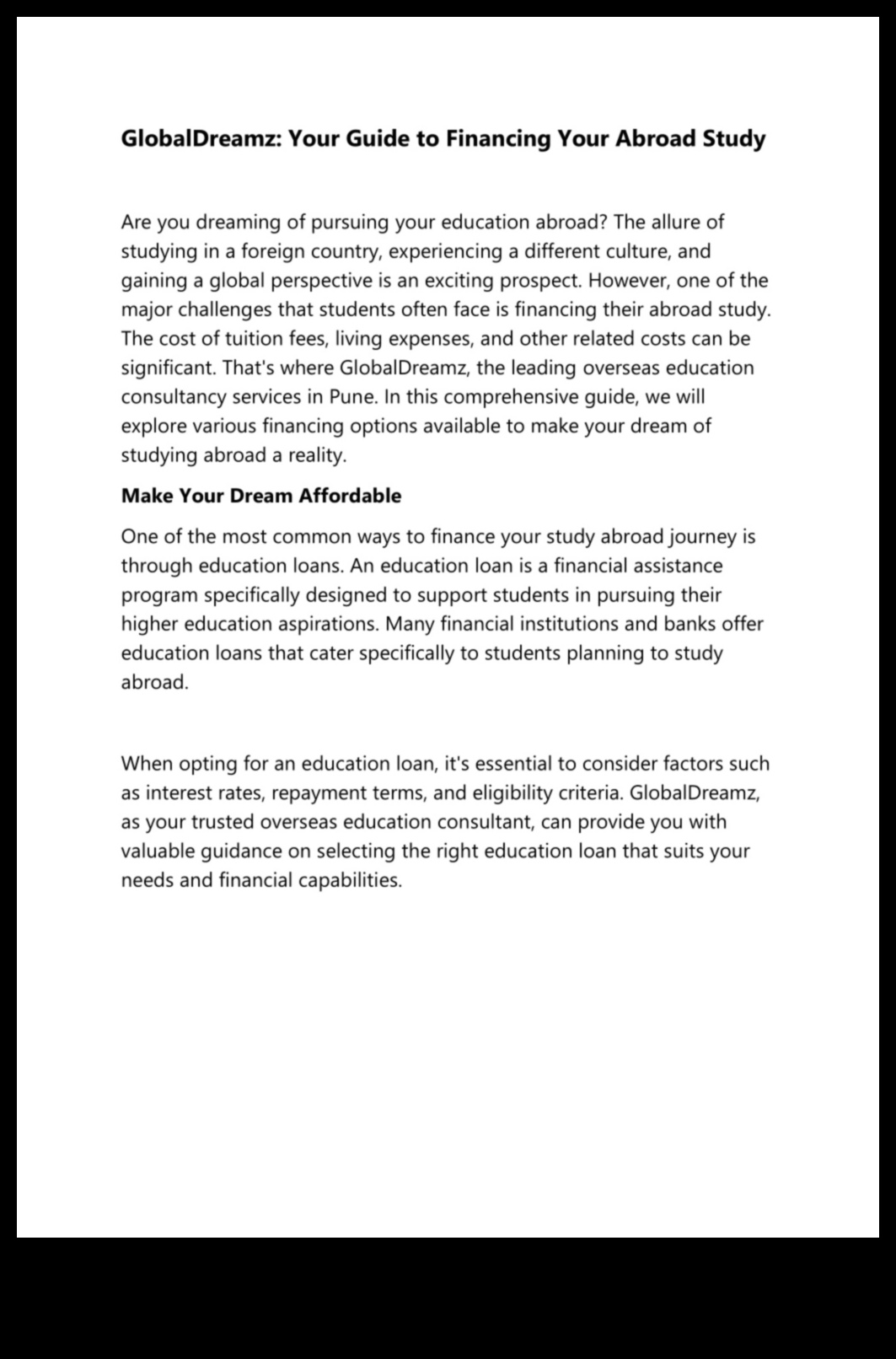
Can You Get Student Loans for Studying Abroad?
- Introduction
- Types of study abroad loans
- How to apply for a study abroad loan
- Cost of study abroad
- Scholarships and grants for study abroad
- Financial aid for study abroad
- Tips for saving money for study abroad
- How to pay off your study abroad loan
- The benefits of studying abroad
- FAQ
Keywords: study abroad, student loans, financial aid, international students, scholarships
The search intent of the keyword “can you get student loans for studying abroad” is to find out if it is possible to get student loans to study abroad. People who search for this keyword are likely to be interested in studying abroad but are not sure if they can afford it. They may be looking for information on how to get student loans for studying abroad, or they may be wondering if there are any other financial aid options available to them.
| Feature | Answer |
|---|---|
| Study Abroad | Studying abroad is an opportunity to learn about new cultures, languages, and ways of life. It can also be a great way to improve your resume and make connections with people from all over the world. |
| Student Loans | Student loans can be a great way to finance your study abroad experience. However, it’s important to make sure that you understand the terms of the loan and that you’re able to repay it. |
| Financial Aid | There are a number of financial aid options available for students who want to study abroad. These options include scholarships, grants, and work-study programs. |
| International Students | International students have a number of unique challenges when it comes to studying abroad. These challenges include finding a program that’s right for you, getting a visa, and adjusting to a new culture. |
| Scholarships | There are a number of scholarships available for students who want to study abroad. These scholarships can help you cover the cost of tuition, room and board, and travel expenses. |

II. Types of study abroad loans
There are a few different types of study abroad loans available, each with its own set of benefits and drawbacks. The most common type of study abroad loan is a private student loan. Private student loans are offered by banks and other lenders, and they typically have higher interest rates than federal student loans. However, they may also offer more flexible repayment terms.
Another type of study abroad loan is a federal student loan. Federal student loans are offered by the U.S. Department of Education, and they have lower interest rates than private student loans. However, they are also more restrictive in terms of repayment terms.
Finally, there are also a number of scholarships and grants available for study abroad. Scholarships and grants are awarded based on merit or financial need, and they do not have to be repaid.
When choosing a study abroad loan, it is important to carefully consider the different types of loans available, as well as the terms and conditions of each loan. It is also important to make sure that you can afford the monthly payments on the loan.
3. Types of study abroad loans
There are a variety of different types of study abroad loans available, each with its own set of terms and conditions. Some of the most common types of study abroad loans include:
- Federal student loans
- Private student loans
- Institutional loans
- Scholarships and grants
Each type of loan has its own advantages and disadvantages, so it’s important to weigh your options carefully before you decide which one is right for you.
For more information on the different types of study abroad loans, please see our Types of Study Abroad Loans article.
IV. Cost of study abroad
The cost of studying abroad can vary significantly depending on the country you choose to study in, the length of your program, and your living expenses. In general, you can expect to pay between $10,000 and $50,000 for a semester or year of study abroad.
Here are some factors that can affect the cost of studying abroad:
- The country you choose to study in: The cost of living in different countries can vary significantly. For example, studying in a European country will typically be more expensive than studying in a Southeast Asian country.
- The length of your program: The longer your program, the more you will pay in tuition and fees.
- Your living expenses: Your living expenses will include things like rent, food, transportation, and entertainment.
It is important to factor in all of these costs when budgeting for your study abroad experience. You should also make sure to have enough money saved up to cover any unexpected expenses.

V. Scholarships and grants for study abroad
There are a number of scholarships and grants available for students who want to study abroad. These scholarships are offered by a variety of organizations, including governments, universities, and private foundations.
Some of the most popular scholarships for study abroad include the following:
- The Fulbright Scholarship Program
- The Gates Cambridge Scholarship
- The Rhodes Scholarship
- The Marshall Scholarship
- The Schwarzman Scholarship
These scholarships are highly competitive, and applicants must have a strong academic record and a compelling personal statement. However, they can provide a significant amount of financial assistance to students who want to study abroad.
In addition to these major scholarships, there are also a number of smaller scholarships and grants that are available for students who want to study abroad. These scholarships are often offered by universities, colleges, and community organizations.
Students who are interested in finding scholarships and grants for study abroad should do their research early. They should start by looking at the websites of the organizations that offer scholarships and grants. They should also talk to their teachers, guidance counselors, and college admissions officers.
Students who are awarded scholarships and grants for study abroad will be able to save money on the cost of their education. This will allow them to study at a more prestigious university or college, or to study in a more expensive country.

6. How to pay off your study abroad loan
Paying off your study abroad loan can be a challenge, but it is important to remember that you are not alone. Many international students take out student loans to finance their studies, and there are a number of resources available to help you repay your loan.
Here are a few tips for paying off your study abroad loan:
- Create a budget and stick to it.
- Make extra payments whenever possible.
- Consider consolidating your loans.
- Refinance your loans to a lower interest rate.
- Seek out financial assistance from your school or government.
By following these tips, you can make the process of paying off your study abroad loan more manageable.

VII. Tips for saving money for study abroad
Here are some tips for saving money for study abroad:
- Start saving early. The sooner you start saving, the more time you will have to accumulate money.
- Look for scholarships and grants. There are many scholarships and grants available for students who want to study abroad.
- Work part-time or get a summer job. This can help you earn extra money to put towards your study abroad expenses.
- Consider taking a gap year. This can give you time to save money and work towards your study abroad goals.
- Live with a host family or in a shared accommodation. This can help you save money on housing costs.
- Cook your own meals. This can help you save money on food costs.
- Explore free activities. There are many free activities to do in most cities, so you don’t have to spend a lot of money to have a good time.
By following these tips, you can save money and make your study abroad dreams a reality.
How to pay off your study abroad loan
Paying off your study abroad loan can be a challenge, but it is important to remember that you are not alone. Many students take out student loans to study abroad, and there are a number of resources available to help you repay your loan.
Here are a few tips for paying off your study abroad loan:
- Create a budget and stick to it.
- Make extra payments whenever possible.
- Consider consolidating your loans.
- Refinance your loans to a lower interest rate.
- Apply for student loan forgiveness programs.
By following these tips, you can make the process of paying off your study abroad loan more manageable.
IX. The benefits of studying abroad
Studying abroad can provide you with a number of benefits, both personal and professional. Some of the benefits of studying abroad include:
- Cultural immersion
- Language acquisition
- Increased global perspective
- Improved critical thinking skills
- Networking opportunities
- Career advancement
If you are considering studying abroad, be sure to weigh the benefits and costs carefully to make sure that it is the right decision for you.
X. FAQ
Q: Can I get student loans to study abroad?
A: Yes, you can get student loans to study abroad. However, not all student loans are eligible for study abroad, and the terms and conditions of study abroad loans may vary from those of domestic student loans.
Q: What are the different types of study abroad loans?
A: There are two main types of study abroad loans: federal student loans and private student loans. Federal student loans are offered by the U.S. Department of Education, and private student loans are offered by banks and other lenders.
Q: How do I apply for a study abroad loan?
A: The application process for a study abroad loan will vary depending on the type of loan you are applying for. For federal student loans, you will need to fill out the FAFSA form. For private student loans, you will need to submit a loan application to the lender.